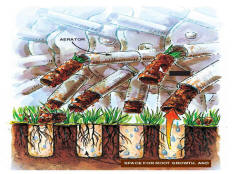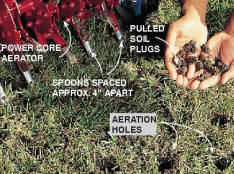10% Guarantee
We will beat any competitors fertilizing programs by 10% Guaranteed. Call for details.Aerating
Aerating your lawn is a great way to reduce thatch, loosen up compacted soils and make it easier for water and nutrients to reach the roots of your turf.
Even with the best care available, lawns can thin out and lose color due to excessive thatch buildup, too much foot traffic or pet traffic through specific areas that create hard or compacted soils, or periods of high temperature, high humidity, or drought. Turf experts such as golf course superintendents recognize Aerating and Over seeding as the best treatment to control thatch, helps reduce those compacted areas, fills in bare spots and revitalize growth.
An aeration treatment removes small cores of soil and thatch to allow air, moisture and nutrients to penetrate down to the root zone. The cores brought to the surface contain microorganisms, which help the breakdown of the woody thatch tissue layer just below the lawn's crown. As the thatch layer is broken down, it is converted into organic matter that will then combine with existing soil particles.
When's the best time to aerate?
The fall and spring are the best times to aerate. In the fall you
want to aerate between September and November. In spring, aerate
between March and May. Most lawns benefit from annual aeration.
What are the benefits?
Aeration can help make your lawn healthier and reduce its
maintenance requirements through these means:

Also, as the cores begin to breakdown over a period of several weeks, the holes gradually fill in with a mixture of organic matter and soil, and the filled hole allows roots of existing grass plants to spread out and grow deeper, creating a healthier, thicker lawn.
|
|
·
Stronger grass roots
·
Improves fertilizer uptake and use
·
Reduces water runoff and puddling · Enhances water intake by the plant
·
Improves resiliency and cushioning |

More information

